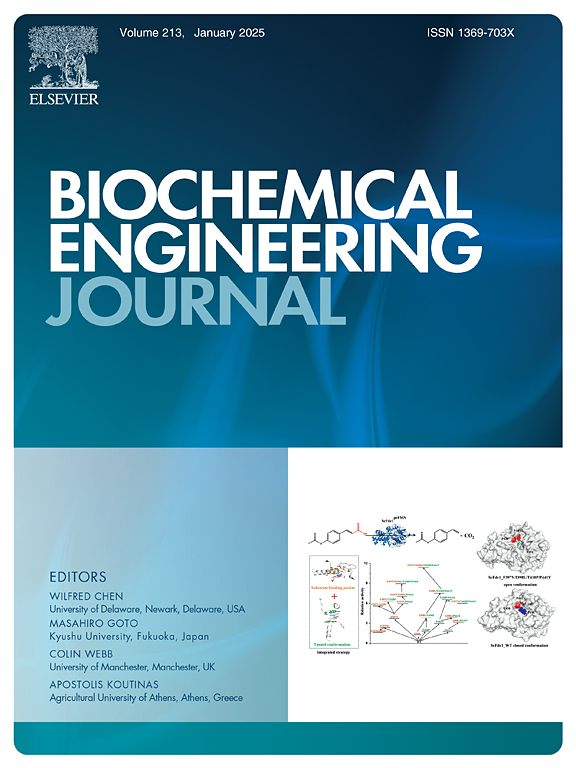Optimizing bamboo biomass for sustainable isobutanol production using genetically engineered Escherichia coli
IF 3.7
3区 生物学
Q2 BIOTECHNOLOGY & APPLIED MICROBIOLOGY
引用次数: 0
Abstract
Researchers are finding sustainable fuel alternatives due to the growing costs and environmental issues related to fossil energy. Isobutanol is an attractive biofuel with a higher energy content than ethanol and the potential to replace gasoline. Bamboo emerges as a promising and cost-effective feedstock for isobutanol production due to its fast growth and high holocellulosic content. By using response surface methodology, this study optimized glucose recovery from bamboo biomass by varying pretreatment temperature (30–70°C), reaction time (0.5–6 h), and NaOH concentration (0.5–3 %). The maximum glucose recovery was achieved using 1 % NaOH at 68°C for 6 hours, resulting in improved cellulose and reduced hemicellulose and lignin content in bamboo. This process released 31.01 mg/mL glucose, representing 65 % of available sugars. Structural modifications of the untreated and alkali-treated bamboo biomass were confirmed through Fourier transform infrared spectroscopy (FTIR) and scanning electron microscopy (SEM). Isobutanol fermentation with the engineered E. coli strain JCL260 produced 2.28 g/L of isobutanol from enzymatic hydrolysate, achieving 22.86 % of the theoretical maximum. This study determines that cellulose from bamboo has been efficiently transformed into isobutanol through fermentation, although at a lower concentration associated with pure glucose.
利用转基因大肠杆菌优化竹子生物量以实现可持续的异丁醇生产
由于与化石能源相关的成本和环境问题不断增加,研究人员正在寻找可持续的燃料替代品。异丁醇是一种有吸引力的生物燃料,其能量含量高于乙醇,具有替代汽油的潜力。竹子因其生长快、纤维素含量高而成为生产异丁醇的一种有前景且具有成本效益的原料。采用响应面法,通过改变预处理温度(30-70°C)、反应时间(0.5-6 h)和NaOH浓度(0.5-3 %),优化了竹生物质中葡萄糖的回收率。在1 % NaOH条件下,在68°C下,6 小时的葡萄糖回收率最高,提高了纤维素含量,降低了竹中的半纤维素和木质素含量。该过程释放出31.01 mg/mL葡萄糖,占可利用糖的65% %。通过傅里叶变换红外光谱(FTIR)和扫描电镜(SEM)研究了未经处理和碱处理的竹子生物量的结构变化。用工程菌株JCL260进行异丁醇发酵,酶解产物异丁醇产量为2.28 g/L,达到理论最大值的22.86 %。本研究确定,尽管与纯葡萄糖相关的浓度较低,但竹子中的纤维素通过发酵有效地转化为异丁醇。
本文章由计算机程序翻译,如有差异,请以英文原文为准。
求助全文
约1分钟内获得全文
求助全文
来源期刊

Biochemical Engineering Journal
工程技术-工程:化工
CiteScore
7.10
自引率
5.10%
发文量
380
审稿时长
34 days
期刊介绍:
The Biochemical Engineering Journal aims to promote progress in the crucial chemical engineering aspects of the development of biological processes associated with everything from raw materials preparation to product recovery relevant to industries as diverse as medical/healthcare, industrial biotechnology, and environmental biotechnology.
The Journal welcomes full length original research papers, short communications, and review papers* in the following research fields:
Biocatalysis (enzyme or microbial) and biotransformations, including immobilized biocatalyst preparation and kinetics
Biosensors and Biodevices including biofabrication and novel fuel cell development
Bioseparations including scale-up and protein refolding/renaturation
Environmental Bioengineering including bioconversion, bioremediation, and microbial fuel cells
Bioreactor Systems including characterization, optimization and scale-up
Bioresources and Biorefinery Engineering including biomass conversion, biofuels, bioenergy, and optimization
Industrial Biotechnology including specialty chemicals, platform chemicals and neutraceuticals
Biomaterials and Tissue Engineering including bioartificial organs, cell encapsulation, and controlled release
Cell Culture Engineering (plant, animal or insect cells) including viral vectors, monoclonal antibodies, recombinant proteins, vaccines, and secondary metabolites
Cell Therapies and Stem Cells including pluripotent, mesenchymal and hematopoietic stem cells; immunotherapies; tissue-specific differentiation; and cryopreservation
Metabolic Engineering, Systems and Synthetic Biology including OMICS, bioinformatics, in silico biology, and metabolic flux analysis
Protein Engineering including enzyme engineering and directed evolution.
 求助内容:
求助内容: 应助结果提醒方式:
应助结果提醒方式:


